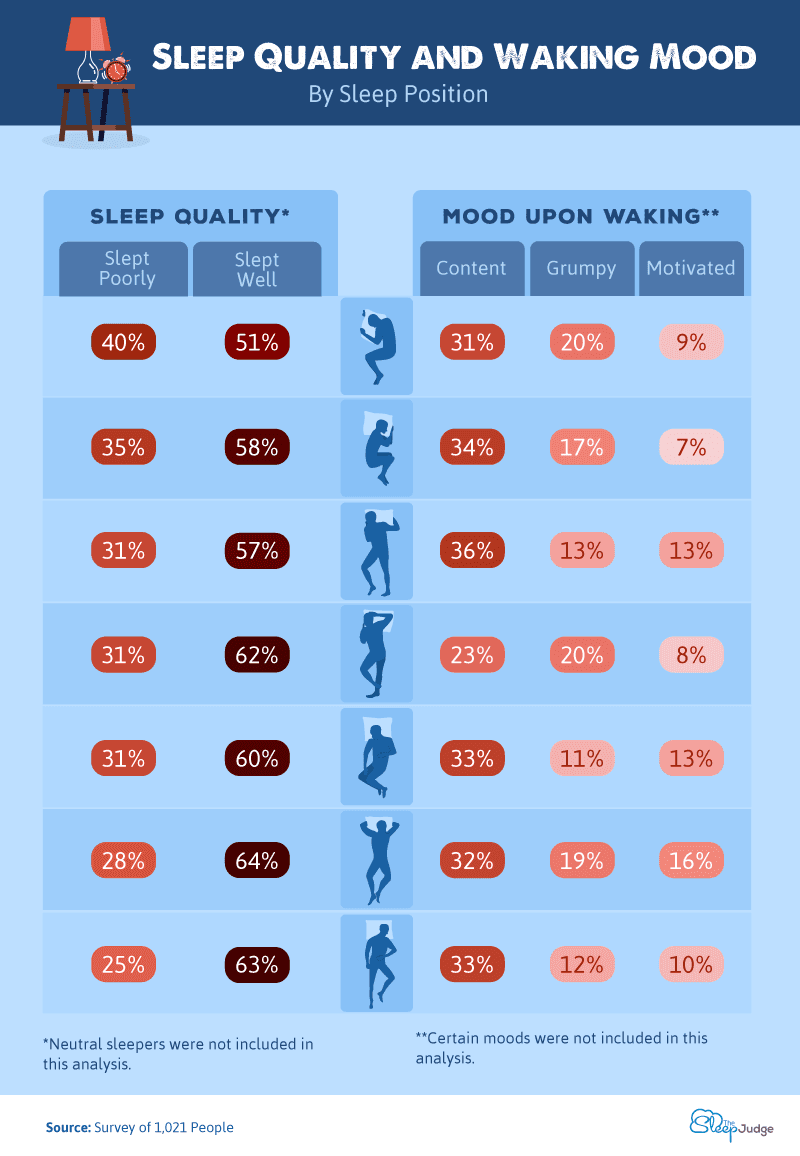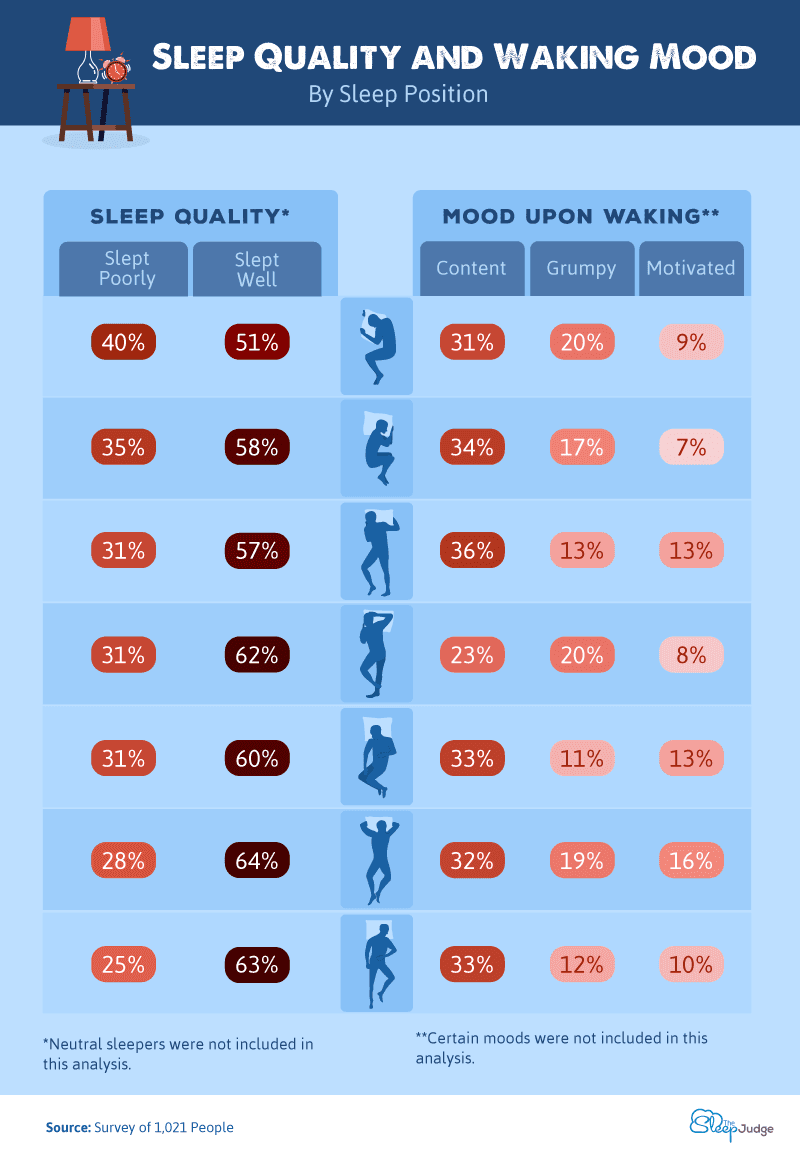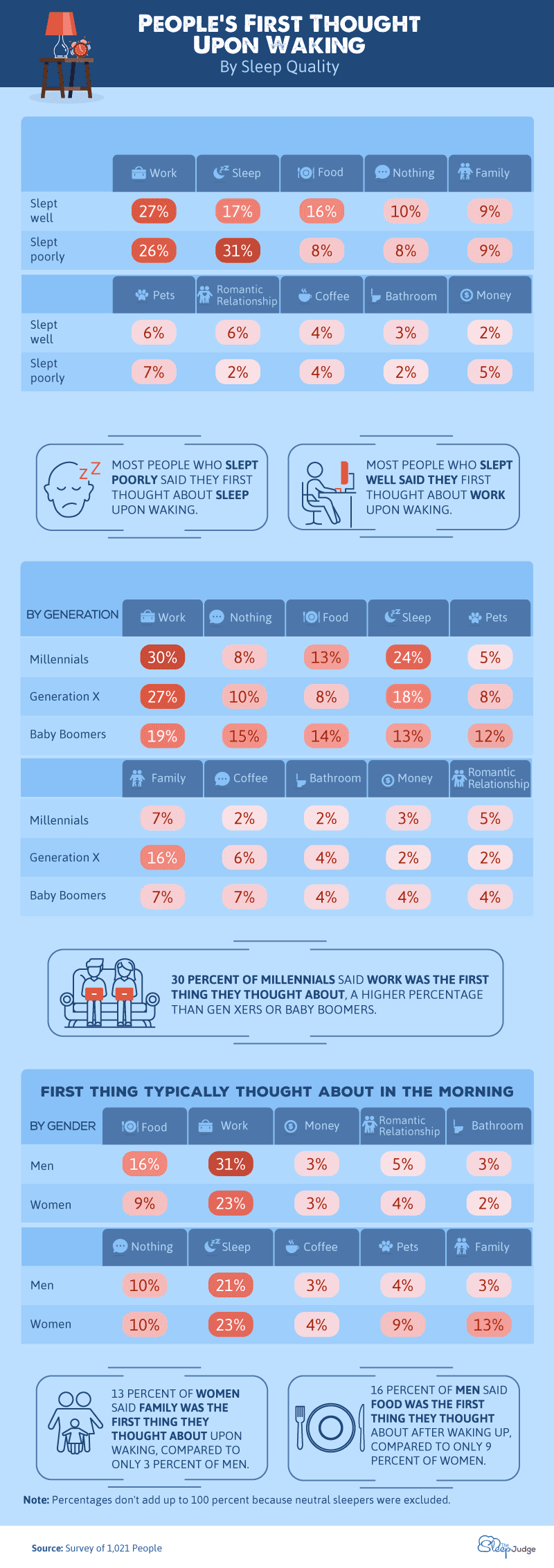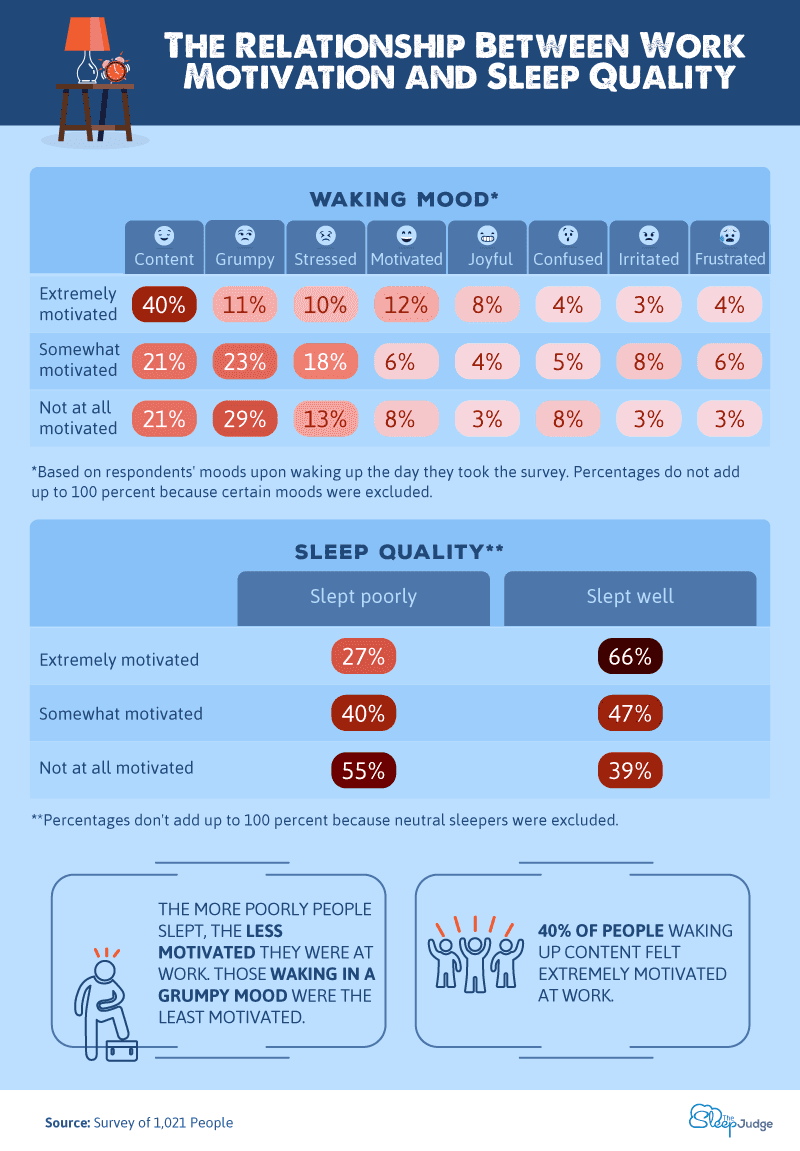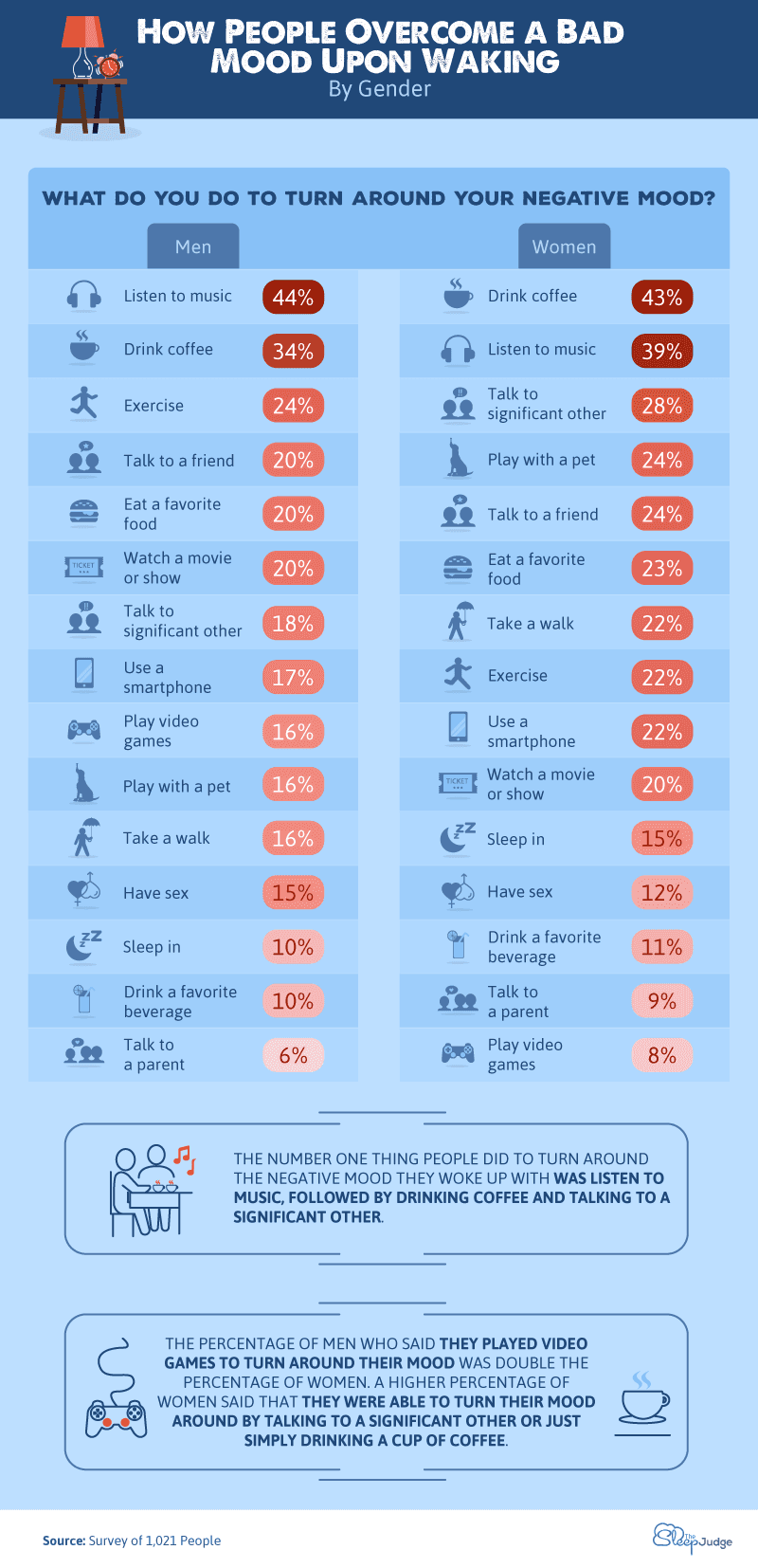Sleep is not only a great way to end the day – it’s a crucial part of good health. Great sleep habits can pay dividends, not only to how we feel but how we view the world. After all, you spend about a third of your day snoozing,1so you want to make sure that you snag quality sleep as often as possible.
How we feel when we wake up can depend on a number of factors: our sleeping position, how our sleeping environment is set up, and other aspects that may be beyond our control, such as noisy neighbors or a creaking house. We polled 1,021 people to find out how they’re feeling right now and how their current mood could have been affected by the zzz’s they got (or didn’t get) the night before. Let’s take a look to see how waking up on the wrong side of the bed can impact our mood and our whole day.
The Right and Wrong Side of Bed
Everyone has their own specific preferences when it comes to how they arrange their body when they sleep, and it seems the back sleepers we polled slept the best of all our respondents. Experts say sleeping on the back can be best,2 as it allows your head, neck, and spine to remain in a neutral position. It’s even better for your sleep if you place a small pillow under your knees to keep stress off your spine.3 However, not everyone is comfortable sleeping this way, and snoring can become more severe if you’re on your back (if that’s a problem for you). This position can also be dangerous for those who experience sleep apnea.
Side sleeping is a popular choice for those who are looking to get comfortable, but it may not be the best bet, at least according to our respondents. Forty percent of side sleepers who sleep in the fetal position with their pillow vertical in our poll reported having slept poorly in this position. This seems high, especially when compared to those who slept on their backs, but with a bent leg and slightly turned – only 25 percent of these folks reported poor sleep.
When quizzed about their mood upon waking, the results were similar when compared to how they slept. The grumpiest folks were side sleepers, but we also found that people who slept on their stomachs were equally grumpy when they rose. Those who reported feeling motivated upon waking were – you guessed it – back sleepers – who were also among the least likely to report poor sleep.
Woke Up in a Bad Mood
Next, we took a look at those who shared a sleeping space with their significant other. Those who slept in opposite directions (backs in, faces out) were the ones who slept the poorest out of our respondents – 37 percent reported a lousy night’s sleep. Those who slept in a distant “spoon” position (one person facing the other’s back, but not close together) were the least likely to report a poor night of sleep (only 17 percent did, while 72 percent of those who slept this way said they slept well).
The grumpiest co-sleepers happened to be couples who both slept on their backs – around 19 percent reported being cranky upon awakening. Those who were distant spooners, however, were the most likely to be content (38 percent) and motivated (15 percent) among all our respondents.
Of all the possibilities we encountered during this study, which couple’s sleep position reported the highest relationship satisfaction? It was the “spoon,” where one person faced the other’s back, but they sleep close together. Ninety-nine percent of these folks reported they’re satisfied with their relationship, while those who slept with their back to their partner’s back weren’t quite as satisfied – only 85 percent reported they were happy with their relationship.
What’s on Your Mind?
What was your first thought when you woke up today? It turns out, your initial thoughts upon waking may have something to do with how you slept – at least according to our poll, anyway. Most of our respondents who reported they slept poorly said the very first thought that entered their mind when they woke up was about, well, sleep. In other words, they might have wished they could sleep longer or were thinking that they should have gone to bed earlier. On the contrary, those who slept well were most likely to think about their jobs first thing.
Other common first thoughts involved food (16 percent for those who slept well and 8 percent for those who did not), family (9 percent for both types of sleepers), coffee (4 percent for both sleepers), money (slightly more often in those who slept poorly), and the bathroom (3 percent for those who slept well and 2 percent for those who slept poorly).
We also looked at the differences between the sexes. Work was on the mind more often for men than women (31 percent and 23 percent, respectively), while the guys were also more likely to think about food first thing (16 percent, compared to 9 percent of women). However, women were more apt to think about family upon awakening (13 percent for the gals, while only 3 percent of guys went this direction when they first woke up).
Generational differences also accounted for some interesting disparities as well. Thirty percent of millennials reported thinking about work first thing (compared to 27 percent of Gen Xers and 19 percent of baby boomers – which makes sense as many boomers are of retirement age). Gen X, however, was more than twice as likely than the other two generations to think about family first thing in the morning.
You might be interested in The Many Effects of Sleeping on a Bad Mattress
Waking up Motivated
There are a number of things that motivate us as we move throughout the day, but for those of us in the workforce, getting to work and doing a great job is one of the biggest motivators we can have. How does work motivation affect sleep, however? Fortunately, we were able to glean some knowledge from our poll, and as it turns out, motivated folks tended to report sleeping well and waking up happy.
To pare it down some, those who were super motivated at work were more likely (at a clip of 40 percent) to wake up in a perfectly content mood, while those who were the least motivated tended to wake up grumpy (29 percent of unmotivated people reported feeling this way upon waking). Also, 66 percent of extremely motivated people reported they slept great, while those who weren’t motivated at all were more likely to say they slept terribly.
Getting Over It
Once you’ve greeted the day with a sour mood, what do you do to bring yourself out of it? We asked our respondents to dish on their most successful ways to lighten up, and it turns out listening to music was the No. 1 way they accomplished this (44 percent of men and 39 percent of women). This is a practice with a solid scientific background. Therapists have long used music therapy as a tool to help improve cognitive function in patients who have memory problems4 because it helps them connect to a happy time or place – and this is something that anyone can utilize, even when they’re just feeling grumpy when first rousing.
Drinking coffee to improve a foul mood ranked highly for both sexes, which is no surprise as caffeine has been shown to help people feel more awake and provides a boost of energy.5 Talking to a significant other is another way our respondents used to try to bring themselves out of a bad mood. Talking to others is a great way to reduce stress,6 and it can help turn your frown upside down if you wake up on the wrong side of the bed.
There were differences between the sexes that did spring up, however. For example, men were twice as likely than women to play video games to boost their morning moods, while women were overall more apt to grab a coffee or talk to their partner than men were. The gals were also more likely to play with their pets than guys, while men were slightly more inclined to exercise than their female counterparts.
Power of Sleep
There are tons of factors that can impact how well we sleep, as well as what our moods will be upon awakening. How we lay in bed, for example, can lead to a night of restful slumber, or it can leave us wanting a bit more shut-eye when we first wake. Our daily wake-up moods can also be impacted by how we snuggle down with a partner at night and can dictate how motivated we are at work.
Methodology
We collected responses from 1,021 people through Amazon’s Mechanical Turk. 54.4% of our participants were female, and 45.6% were male. Participants ranged in age from 18 to 77, with an average of 37 and a standard deviation of 12.6.
When tasked with picking the mood they felt upon waking up the morning of taking the survey, respondents were given the following options to choose from:
- Grumpy
- Joyful
- Content
- Sad
- Stressed
- Frustrated
- Angry
- Proud
- Surprised
- Confused
- Motivated
- Irritated
Certain moods were hidden at times due to low sample sizes.
Respondents were asked to rate their quality of sleep on the following scale:
- Extremely poor
- Poor
- Slightly poor
- Neither poor nor good
- Slightly good
- Good
- Extremely good
58.3% of our participants said that they typically slept well, 32.7% said they typically slept poorly, and 9% said they usually slept neither poorly nor well. Participants ranged in age from 18 to 77 with a mean of 36.8. Participants were excluded if they were clearly not paying attention (e.g., failed attention-check questions or entered obviously inconsistent data).
To be considered to be in a relationship where respondents slept with their partner, they had to say that they were “in a relationship” or “married” and not “single,” “separated,” “divorced,” or “widowed.”
Fair Use Statement
Find this information interesting? Great! Feel free to share it with your readers for noncommercial use. All we ask is that you link back to this page so that your readers can look through our entire analysis. Put them in the position to get a better night’s rest.
Sources
1National Institute of Neurological Disorders and Stroke. (2018). Brain Basics: Understanding Sleep. Retrieved from https://www.ninds.nih.gov/Disorders/Patient-Caregiver-Education/Understanding-Sleep
2The Best Sleep Position for Your Body. (n.d.) Retrieved from https://sleep.org/articles/best-sleep-position/
3Bellendir, T., Joseph, T. (n.d.) Good Sleeping Posture Helps Your Back. Retrieved from https://www.urmc.rochester.edu/encyclopedia/content.aspx?ContentTypeID=1&ContentID=4460
4Fabiny, A. (2015). Music Can Boost Memory and Mood. Retrieved from https://www.health.harvard.edu/mind-and-mood/music-can-boost-memory-and-mood
5Caffeine. (2018). Retrieved from https://medlineplus.gov/caffeine.html
6Stress Management and Prevention. (n.d.) Retrieved from https://www.buffalo.edu/studentlife/life-on-campus/health/stress-management.html

